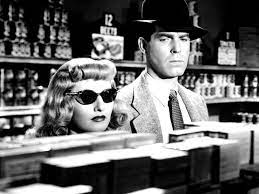by Katharine Elizabeth Monahan Huntley

| “Kind of a crazy story with a crazy twist to it. One you didn’t quite figure out.”—Double Indemnity “A puzzle you won’t ever solve.”—Memento Christopher Nolan’s intricate trick of a movie Memento, belongs to the legacy of Billy Wilder’s film noir, Double Indemnity. Wilder’s 1944 award-winning classic, co-written with hard-boiled crime fiction author Raymond Chandler, and based upon James M. Cain’s novella, set the screen standard for all aspects noirish—amoral characters, ambivalent themes, taut plots, and an atmosphere colored by shifting shades of drifting gray. Double Indemnity’s Walter Neff and Memento’s Leonard Shelby are both in the insurance game—an industry perceived to be a necessary evil, employing as many scam artists as the clients who file false claims. Each film’s main character skirts around the edges of Los Angeles’ San Fernando Valley—where Santa Anas blow ill winds and nobody is quite whom they seem: Neff: Where did you pick up this tea drinking? You’re not English, are you? Phyllis: No. Californian. Born right here in Los Angeles. Neff: They say native Californians all come from Iowa. Teddy: Leonard, you don’t have a clue what’s going on. You don’t even know my name. Leonard: (triumphant smile) Teddy! Teddy: You read it off your fucking photo. You don’t know me, you don’t even know who you are. Neff’s “movements are easy and full of ginger.” He utters street-smart patter as he slouches against doorjambs, coolly waiting for beguiling blondes dolled up in slit summer dresses and cheap anklets to flounce down a staircase with the right proposition. In Phyllis Dietrichson’s case, it’s the disposal of her husband and collection of cold hard cash: Phyllis: Could I get an accident policy for him—without bothering him at all? Neff: . . . You want him to have the policy without him knowing it. And that means without the insurance company knowing that he doesn’t know. That’s the set-up, isn’t it? . . . And then, some dark wet night . . . You want to knock him off, don’t you, baby? Crocodile tears slither out from Phyllis’s come-hither eyes. The look is enough to hook Neff—this gun’s for hire: Neff: . . . It all tied up with something I had been thinking about for years, since long before I ever ran into Phyllis Dietrichson. Because, in this business you can’t sleep for trying to figure out the tricks they could pull on you. You’re like the guy behind the roulette wheel, watching the customers to make sure they don’t crook the house. And then one night, you get to thinking how you could crook the house yourself. . . . And suddenly the doorbell rings and the whole setup is right there in the room with you. . . . The stakes were fifty thousand dollars, but they were the life of a man, too, a man who’d never done me any dirt. Except he was married to a woman he didn’t care anything about, and I did . . . Memento’s Leonard also has a fatal obsession. Retaliation for his wife’s rape and murder: Teddy: You really wanna find this guy? Leonard: He took away the woman I love, and he took away my memory. He destroyed everything; my life and my ability to live. Teddy: You’re living. Leonard: Just for revenge. The pursuit for vengeance is problematic for Leonard, as he suffered a head injury during the incident and has no short-term memory: Leonard: I know who I am and all about myself, but . . . I can’t make any new memories. Everything fades. If we talk too long, I’ll forget how we started. I don’t know if we’ve ever met before, and the next time I see you I won’t remember this conversation. Leonard is damaged and damned—a man with no context: Leonard: I have to believe in the world outside my own mind. I have to believe my actions still have meaning, even if I can’t remember them. I have to believe that when my eyes are closed the world’s still out there. Walter Neff and Leonard Shelby do their dirty deeds, but in true cinema noir cynical fashion, they fail to attain any measure of gratification: Neff: I didn’t get the money and I didn’t get the woman. Pretty, isn’t it? Teddy: . . . We found him and you killed him. . . . I’ve never seen you so happy—I was convinced you’d remember. But it didn’t stick, like nothing ever sticks. Like this won’t stick. Dialogue that interlocks like a zipper’s metal tabs creates complicity between the audience and anti-heroes of Double Indemnity and Memento. Yes, they’re killers, but killers wry and witty: Neff: Where would the living room be? Maid: In there, but they keep the liquor locked up. Neff: That’s okay. I always carry my own keys. Leonard: So how many rooms am I checked into in this dump? Burt: Just two. So far. Leonard: Well, at least you’re being honest about cheating me. Burt: Yeah, well you’re not gonna remember, anyway. Leonard: You don’t have to be that honest, Burt. Walter and his paramour, partner-in-crime Phyllis, mortally wound each other, a strategic decision in obtaining script approval from the Hays Office because the “. . . Production Code still demanded that criminals pay onscreen for their transgressions.” Before his death, Neff confesses all to Barton Keyes—the man who plays the part of Neff’s conscience: Neff: I wanted to straighten out that Dietrichson story for you. . . . And now I suppose I get the big speech, the one with all the two-dollar words in it. Let’s have it, Keyes. Keyes: You’re all washed up, Walter. Neff: Thanks, Keyes. That was short anyway. In this new millennium, (particularly in independent film), Nolan has no such morality constraints. He is not limited to black and white—literally, in the aesthetic of the film’s look, or figuratively, in the ambiguity of the story’s outcome. Cool blue hues saturate Leonard’s world of loss. Users and losers are on hand to lend menace and pathos. They slink on the sidelines of salvation—no chance or care for redemption. Femme fatales look vaguely the same: opaque-eyed and contemptuous. Including Leonard’s dead (if she is indeed) wife. Tragedy thrives in the burnt embers of her mementos—the love he “can’t remember to forget”: Natalie: What’s the last thing you remember? Leonard: My wife. Natalie: Sweet. Leonard: Dying. Beyond avenging his wife’s death, Leonard becomes a killer for his own convenience. Once Teddy, Leonard’s untrustworthy and unreliable sidekick, accuses him of deliberate memory fidgeting to continue the quest for: “a dead wife to pine for and a sense of purpose in your life,” Leonard blows him away. Tossing Teddy’s car keys into the bushes, Leonard Shelby metaphorically kisses the “keys” to his conscience good-bye, and Christopher Nolan ushers in his version of neo-noir. Much to the delight, one may well imagine, of Billy Wilder’s grinning ghost. Notes Billy Wilder and Raymond Chandler, Double Indemnity (original shooting script dated September 25, 1943), reproduced in Double Indemnity/Billy Wilder; screenplay by Billy Wilder, Raymond Chandler; with an introduction by Jeffrey Meyers. (Berkeley: University of California Press, 2000), p. 26. Christopher Nolan, Memento (screenplay dated October 4, 1999), pp. 3-3A. Wilder, Double Indemnity, p. 11. Ibid., pp. 28-29. Ibid., pp. 36-37. Nolan, Memento, p. 30. Ibid., p. 9. Ibid., p.118. Wilder, Double Indemnity, p. 11. Nolan, Memento, p.115. Wilder, Double Indemnity, p. 14. Nolan, Memento, p. 25. Kevin Lally, Wilder Times: The Life of Billy Wilder (New York: Henry Holt, 1996), p. 134. Wilder, Double Indemnity, p. 116. Nolan, Memento, p. 57. Ibid., p. 87. Ibid., p.116. |
